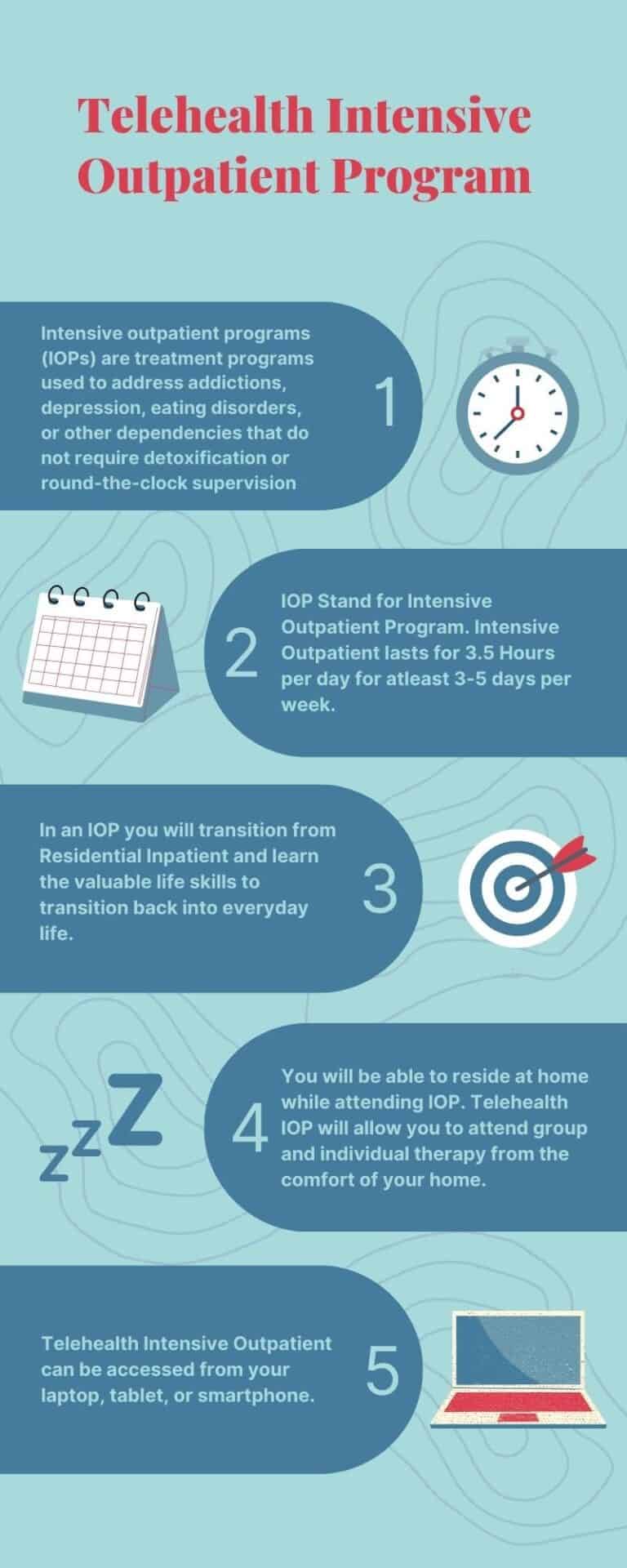Intensive Outpatient Program (IOP): A Flexible Solution for Addiction Treatment.
Intensive Outpatient Program (IOP): A Flexible Solution for Addiction Treatment.
Blog Article
Browsing the Complexities of Twin Medical Diagnosis Treatment Within an Intensive Outpatient Program Establishing
In the realm of mental wellness and dependency treatment, the junction of double diagnosis presents a nuanced obstacle that demands a comprehensive and customized method. Within the confines of an Extensive Outpatient Program (IOP) setting, the intricacies of attending to co-occurring mental wellness disorders and material utilize disorders need a fragile equilibrium of experience and resources to browse. The combination of evidence-based techniques, collective initiatives among multidisciplinary groups, and a keen understanding of the unique requirements of each person are necessary components in successfully managing double medical diagnosis within an IOP framework. By discovering the complexities of twin diagnosis treatment within this extensive outpatient context, a clearer path arises towards alternative and lasting recovery for those coming to grips with these linked challenges.
Twin Diagnosis Summary
What is the importance of comprehending double diagnosis in psychological health and wellness therapy? Twin medical diagnosis refers to the co-occurrence of a substance use disorder and a mental health and wellness condition in an individual. It is vital to acknowledge and resolve this comorbidity as it can substantially influence the performance of mental health and wellness treatment. Without proper identification and administration of both conditions, people might have a hard time to achieve long-term recovery and security.
Comprehending double medical diagnosis is important as it requires an extensive and integrated strategy to treatment. By acknowledging the interplay in between compound usage and psychological wellness, doctor can customize treatments to satisfy the distinct demands of each individual. This all natural strategy not just addresses signs and symptoms but likewise targets hidden aspects that add to the dual diagnosis.
Furthermore, unattended double medical diagnosis can result in a cycle of relapse and intensifying psychological wellness signs and symptoms. By acknowledging the intricacy of double diagnosis and offering specialized treatment, medical care professionals can sustain individuals in achieving lasting recuperation and boosted psychological health.
Tailored Therapy Plans
Acknowledging the detailed interplay between material use disorders and psychological health problems, the advancement of customized therapy strategies is extremely important in attending to the complexities of twin medical diagnosis in mental wellness therapy. Customized therapy strategies are customized strategies that consider the special demands, obstacles, and objectives of people encountering twin diagnosis. These plans are designed collaboratively by a multidisciplinary group of experts, consisting of psychiatrists, psychologists, social workers, and addiction experts, to make certain comprehensive and incorporated treatment.
Tailored treatment plans typically involve a mix of therapies, drugs, and behavioral treatments that target both the substance usage condition and the mental health problem at the same time. These plans may consist of cognitive-behavioral treatment, dialectical behavior modification, medication-assisted treatment, specific counseling, group treatment, and family therapy, among various other evidence-based interventions. By tailoring treatment strategies to specific scenarios, tailored strategies can attend to the root creates of dual diagnosis, promote long-term healing, and enhance overall lifestyle for people dealing with see post co-occurring disorders.
Integrated Care Approach

By integrating social treatments like household therapy, trade support, and community sources, the therapy ends up being much more holistic and customized to the individual's particular requirements. On the whole, an incorporated treatment strategy in dual diagnosis therapy within an intensive outpatient program setup aims to supply detailed, reliable, and personalized care to people dealing with co-occurring disorders (Intensive Outpatient Program (IOP)).
Difficulties in IOP Setting
In the context of dual diagnosis treatment within an extensive outpatient program, browsing the complexities of co-occurring material usage problems and psychological health and wellness conditions presents significant challenges. One of the primary difficulties in the IOP setup is the control of treatment in between mental wellness specialists and chemical abuse experts to guarantee a comprehensive therapy strategy. This needs reliable communication, collaboration, and a deep understanding of just how these conditions interact and affect each other.
In addition, the changing nature of compound use disorders and psychological health problems includes one more layer of intricacy - Intensive Outpatient Program (IOP). Clients in an IOP may experience sudden shifts image source in their signs and symptoms or substance yearnings, requiring timely intervention and adjustment of therapy approaches. Stabilizing the strength of treatment and assistance while enabling customers the versatility to handle their day-to-day duties can be a fragile stability to preserve
Furthermore, addressing preconception and resistance to treatment within the IOP setting can hamper progression. Some people might be reluctant to divulge their twin medical diagnosis or might feel embarrassed, preventing their interaction in the restorative process. Getting rid of these obstacles requires an encouraging and non-judgmental environment that promotes trust fund and openness.

Collaborative Professional Initiatives

Collective efforts likewise prolong to normal interaction and info sharing among team participants to make certain a cohesive treatment strategy. Eventually, an unified front of experts functioning together improves the efficiency of twin diagnosis therapy within an extensive outpatient program.
Final Thought
In conclusion, efficient twin diagnosis therapy within an intensive outpatient program setup requires tailored therapy strategies and an integrated treatment technique. Challenges may occur in this setup, yet collaborative efforts amongst professionals can help navigate these complexities. By resolving the distinct needs of individuals with co-occurring mental health and wellness and substance utilize problems, IOP programs can give thorough and holistic treatment to sustain recuperation and total health.
Report this page